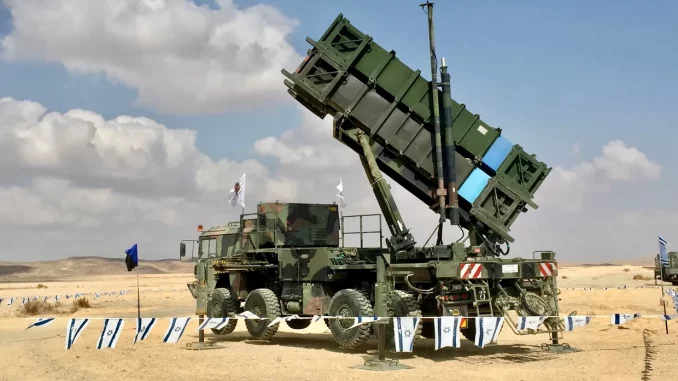
A Patriot air defense launcher goes into action during the Air Force training in Uvda, Israel, 8 November 2017. (Sara Lemel / Picture alliance via Getty Images)
| Published June 11, 2025
Comments by Ambassador Michael Brodsky, which appear to confirm past reports, made during interview with Ukranian media; Foreign Ministry denies claim following reported Russian requests for clarification
In a development that has drawn international attention, reports and official statements have emerged concerning the possible transfer of Patriot air defense systems from Israel to Ukraine. While a top Israeli diplomat recently suggested that such a transfer occurred, the Israeli government has swiftly and unequivocally denied the claim. This story unfolds amid the backdrop of ongoing international military assistance to Ukraine in its war with Russia.
The Ambassador’s Claim
On June 10, 2025, Michael Brodsky, Israel’s ambassador to Ukraine, stated in an interview with Ukrainian media that Israel had transferred retired Patriot missile systems to Ukraine. Brodsky explained that the systems in question were American-made and had been delivered to Israel in the early 1990s, primarily to counter threats during the Gulf War. According to his statement, these systems had since been decommissioned and were reportedly provided to Ukraine.
His comments sparked widespread media coverage, prompting questions about a potential shift in Israel’s long-standing policy of avoiding direct military support to Ukraine.
Official Israeli Response
Shortly after the ambassador’s comments became public, Israel’s Foreign Ministry released an official statement denying the transfer of any Patriot missile systems to Ukraine. The ministry clarified that Ambassador Brodsky’s comments were “not correct,” emphasizing that Israel has not sent any such systems to the Ukrainian military.
The Israeli Ministry of Defense echoed this position, reiterating that no Israeli weapons systems or platforms had been transferred to Ukraine, either directly or indirectly.
Background on Israel’s Patriot Systems
Israel had operated a number of Patriot missile batteries since the 1991 Gulf War, when the United States provided the system to bolster Israel’s air defense. Over the years, these systems were integrated into the Israeli Air Force’s defense infrastructure but were gradually phased out and replaced by more advanced, domestically developed systems such as the David’s Sling and the Arrow.
In April 2024, the Israeli Air Force officially announced the retirement of its Patriot batteries, completing their removal from operational status. The decommissioning marked a strategic transition toward more modern missile defense technologies.
U.S. Role in Patriot Interceptor Transfers
In January 2025, reports surfaced indicating that the United States had transferred approximately 90 Patriot missile interceptors to Ukraine. These interceptors had previously been stored at a U.S. military facility in Israel. According to U.S. and Israeli media, the operation was carried out by the U.S. military, with no involvement or facilitation by the Israeli government beyond the storage location.
This transfer was part of ongoing U.S. efforts to support Ukraine’s air defense capabilities amid continued Russian aerial assaults.
Russian Reaction
Following the ambassador’s statement and the media coverage surrounding it, Russian officials reportedly requested clarification from the Israeli government regarding any possible weapons transfers to Ukraine. Israel responded through diplomatic channels, maintaining its position that no Israeli-origin missile systems had been provided to the Ukrainian armed forces.
Implications
1. Diplomatic Sensitivities Between Israel and Russia
The public denial by the Israeli government reflects its careful navigation of a complex diplomatic landscape. Israel has maintained a delicate balancing act in the Russia-Ukraine war, aiming to avoid provoking Russia while maintaining strategic ties with Western allies. Any confirmed military aid to Ukraine, particularly involving a U.S.-designed missile system like the Patriot, could complicate Israel’s military coordination with Russia in Syria and other regional arenas.
2. Potential for Miscommunication Within Israeli Foreign Policy
The contradiction between Ambassador Brodsky’s remarks and the Israeli Foreign Ministry’s denial points to potential misalignment within Israel’s foreign policy apparatus. This gap in messaging could undermine diplomatic credibility and fuel confusion among international partners and adversaries alike.
3. Ukraine’s Growing Air Defense Capabilities
Whether through direct transfers or third-party facilitation, Ukraine’s air defense network continues to expand. The deployment of Patriot systems, known for their high-performance interception capabilities, represents a significant enhancement to Ukraine’s defense against missile and drone attacks. This may influence Russia’s calculus in its ongoing air campaigns.
4. U.S. Role in Reallocating Allied Stockpiles
The use of Patriot interceptors stored in Israel—reportedly transferred by the United States—highlights Washington’s strategy of drawing on global U.S.-allied stockpiles to support Ukraine without requiring new production cycles. This could become a model for future arms transfers in protracted conflicts where supply speed is critical.
5. Strain on Israel’s Neutral Posture
Even the perception that Israeli-origin weapons have entered the Ukrainian battlefield could place additional pressure on Israel from both sides of the conflict. Western nations may expect more overt support, while Russia could interpret the situation as a breach of Israel’s neutrality. This balancing act becomes more difficult as the war persists and scrutiny intensifies.
Overall Takeaway:
The controversy over whether Israel supplied Patriot missile systems to Ukraine underscores the intricacies of international military support in the context of the ongoing war. While Israel maintains it did not transfer the systems, the involvement of U.S.-stored Patriot interceptors on Israeli soil highlights how global military logistics can create blurred lines between direct aid and allied cooperation. The situation reflects the growing complexity of arms transfers, diplomatic signaling, and alliance management as the war in Ukraine continues to reshape geopolitical relationships.
SOURCES: THE KYIV INDEPENDENT – Israeli Foreign Ministry denies sending Patriot systems to Ukraine amid conflicting claims
THE KYIV POST – Israel Refutes Claims It Supplied Ukraine With Patriot Missile Defense Systems
THE TIMES OF ISRAEL – Israel denies sending Patriot air defense systems to Ukraine
NEWSWEEK – Israel Denies Envoy’s Claim of Patriot Defenses Given to Ukraine
YNET NEWS – Israel denies ambassador’s claim of Patriot missile transfer to Ukraine
AXIOS – Scoop: U.S. sending dozens of Patriot missiles from Israel to Ukraine
THE NEW YORK POST – US military sending 90 Patriot missile interceptors from Israel to Ukraine: report





Be the first to comment